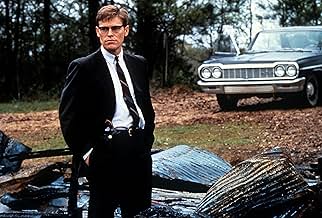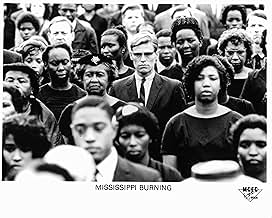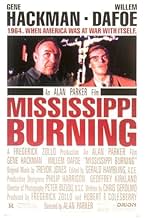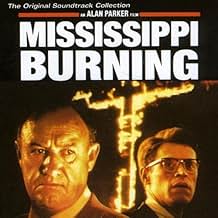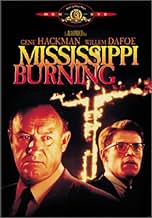Due agenti dell'FBI con stili estremamente diversi arrivano in Mississippi per indagare sulla scomparsa di alcuni attivisti per i diritti civili.Due agenti dell'FBI con stili estremamente diversi arrivano in Mississippi per indagare sulla scomparsa di alcuni attivisti per i diritti civili.Due agenti dell'FBI con stili estremamente diversi arrivano in Mississippi per indagare sulla scomparsa di alcuni attivisti per i diritti civili.
- Regia
- Sceneggiatura
- Star
- Vincitore di 1 Oscar
- 17 vittorie e 25 candidature totali
- Judge
- (as Tom Mason)
Trama
Lo sapevi?
- QuizThe film is inspired by the murder of voting rights activists James Chaney, Michael Schwerner, and Andrew Goodman by the Ku Klux Klan.
- BlooperWhen Anderson throws Pell into the chairs at the barbershop, Pell's stunt double has a different hairstyle (balding, with a comb-over).
- Citazioni
Ward: Where does it come from? All this hatred?
Anderson: You know, when I was a little boy, there was an old negro farmer that lived down the road from us, name of Monroe. And he was... well, I guess he was just a little luckier than my daddy was. He bought himself a mule. That was a big deal around that town. My daddy hated that mule, 'cause his friends were always kidding him that they saw Monroe out plowing with his new mule, and Monroe was going to rent another field now he had a mule. One morning, that mule showed up dead. They poisoned the water. After that, there wasn't any mention about that mule around my daddy. It just never came up. One time, we were driving down that road, and we passed Monroe's place and we saw it was empty. He just packed up and left, I guess, he must of went up north or something. I looked over at my daddy's face. I knew he done it. He saw that I knew. He was ashamed. I guess he was ashamed. He looked at me and said, If you ain't better than a nigger, son, who are you better than?
Ward: You think that's an excuse?
Anderson: No it's not an excuse. It's just a story about my daddy.
Ward: Where's that leave you?
Anderson: My old man was just so full of hate that he didn't know that bein' poor was what was killing him.
- Colonne sonoreTake My Hand Precious Lord
Words and Music by Thomas A. Dorsey
Performed by Mahalia Jackson
Courtesy of CBS Records
But when the murders of those two outside civil rights workers from New York City Michael Schwerner and Andrew Goodman happened the nation was shocked. First it was a missing persons case, then a homicide when the bodies were discovered. Public opinion forced the FBI and its director to take this seriously. And I have to say that when they did, the job was done.
The names of the civil rights workers were not mentioned nor was the name of the young black kid who here was simply in the wrong place at the wrong time. In real life James Morton was a voter registrar working with Goodman and Schwerner. That gave some dramatic license to the producers of Mississippi Burning to spin their own version of events. Given the redneck wall of silence that federal investigators had to deal with I'm not sure the spinning was too far from the truth.
Willem Dafoe's portrayal of a button down FBI agent of the Hoover era rings real true. Hoover's own standards regarding appearance and behavior of his agents somewhat hampered law enforcement in certain fields. He had other foibles that have come down to us since his death in 1972, some real, some speculative. Dafoe just isn't getting the job done.
Which brings us to Gene Hackman who is a former Mississippi sheriff and wise in the ways and mores of Dixie. When Dafoe gives him a free hand Hackman gets results even though like in real life these Ku Klux Klansmen could only be tried in federal court as no Mississippi state jury would have convicted these creatures. Hackman got a well deserved Oscar nomination for his performance. And it's a good thing that the ACLU wasn't looking to hard at Hackman's methods. It was like what Sean Connery taught Kevin Costner about bringing down Al Capone in The Untouchables. It probably did take the FBI bending Hoover's precious rules to get justice in real life.
Frances McDormand plays a truly sad role as the wife of one of the sheriff's deputies who was in on the killing. She's a caring and compassionate woman and indiscreet about her husband's activities. She pays for that. It is restrained, understated, but very powerful performance that netted her a Best Supporting Actress nomination.
Mississippi Burning won for Best Cinematography and got a number of other nominations including Best Picture. Sad to say it was up against Rain Man that year and I'd hate to split the difference between what Hackman and what Dustin Hoffman did in his classic.
It's ironic that I saw this film and between seeing it and writing about it I attended one of many marriage equality rallies throughout the nation as the Supreme Court hears arguments about same sex marriage. The same people who could not comprehend the mixing of races are in the forefront of a fight against marriage equality because their minds can't comprehend that either. A seismic cultural shift against racial segregation took place just as a seismic cultural shift is occurring now toward the acceptance of the LGBT lives and lifestyles. It's been a privilege to live in these interesting times.
Mississippi Burning with a bit of literary license remains a fine dramatic film and should be required viewing for those who want to study those times and get an idea what the civil rights struggle was about. Books will not give you as good an idea as Mississippi Burning will.
- bkoganbing
- 25 mar 2013
- Permalink
I più visti
- How long is Mississippi Burning?Powered by Alexa
Dettagli
Botteghino
- Budget
- 15.000.000 USD (previsto)
- Lordo Stati Uniti e Canada
- 34.603.943 USD
- Fine settimana di apertura Stati Uniti e Canada
- 225.034 USD
- 11 dic 1988
- Lordo in tutto il mondo
- 34.603.943 USD
Contribuisci a questa pagina






